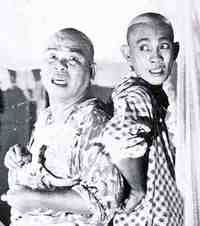Pugo and Togo
During the second world war, film making in the Philippines was heavily censored by the Japanese, so much so that the film making industry eventually folded and stopped producing movies. To counter the loss of the local entertainment industry, The Japanese brought with them their own films. Their movies however, did not appeal to the Filipino audience.
Japanese propaganda officers began hiring local filmmakers, like Gerardo de Leon to make movies that extol Filipino-Japanese friendship. But the Japanese made films almost always had the same story line – that of Japanese and Filipinos as “Friends” and Americans as the “real” enemy. The Filipino audience soon had enough of watching movies that was biased to the Japanese theme of the “Philippines being one with Japan” and that of the “Greater East Asia Co-prosperity Sphere” that they lost their appetite for this sort of entertainment.
With the loss of the local movie industry, many actors depended on stage shows or “bodabil” on major Manila theaters for livelihood. Enter the comedy duo, Pugo (Mariano Contreras) and Togo (Andres Solomon). Bald-headed and witty, Contreras and Solomon started out as the Laurel and Hardy of the Philippines. They started their career as vaudeville performers in the 1930’s and had considerable success.
However, Pugo and Togo caught the ire of the Japanese Propaganda office and had to change their names to “Puguing” and “Tuguing”. The name Togo, they thought “sounds similar to Tojo who was then the Prime Minister of Japan” and the Japanese do not want them to make a mockery of his Excellency’s name.

Pugo and Togo. (from the 1950’s film “Magkumpareng Putik” )
Nevertheless, Puguing ang Tuguing became a hit during the Japanese occupation. The reason was that they made fun of the Japanese occupational forces. Their brand of humor consisted of short skits, slapstick, and funny dialogues which they performed live and on stage in Manila’s popular theaters, most particularly Clover, Life and Avenue.
In one skit, Togo would ask the time and Pugo would then hold up his wrist wearing four or five watches, satirizing the Japanese soldier’s fondness for watches (During that dark period of our history, members of the Imperial Japanese Army were notorious for confiscating wristwatches from civilians and wearing them on their arms all at the same time). In another, Pugo would ask Togo who he was waiting for and he would reply “Si Uncle”, meaning Uncle Sam (the United States). In another skit, Pugo would do a monologue depicting a Japanese official proclaiming that he “love[d] the Philippines” but pronouncing the word “love” as “rob”, making fun of the Japanese soldier’s mispronunciation of the letter “l” and “r.”
Their attempt at the Freedom of Speech however, was not without peril. More often than not, the Japanese Kempetai would “invite” them to their office by forcibly hauling the two comedians to Fort Santiago for interrogation. Luck must have been on their side as after a few days of incarceration and a bit of torture for the perceived “insults” to the Japanese people, they are made to sign an affidavit that they were treated well and are free to go.
Although they were not trying to be heroes, the audience saw through their brand of humor, and appreciated their bravery and their loyalty to the Filipinos and Americans fighting the Japanese.
Source: Video 48, WikiPilipinas
Kerwin Salvador P. Caragos




